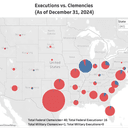
The Alabama Court of Criminal Appeals (CCA) has reversed a lower court ruling and ordered the court to reinstate the death penalty against a Birmingham man whose trial judge had sentenced him to death even though the jury had voted 10 – 2 to recommend a life sentence.
With no judges dissenting, the appeals court on August 6, 2021 overturned a Jefferson County circuit court’s determination that Brandon Deon Mitchell should receive a new penalty phase hearing because of his trial counsel’s failure to present any mitigating evidence to the trial judge in final sentencing proceedings two months after the jury had overwhelmingly recommended that Mitchell receive a life sentence. The appeals court ruled that Alabama law at the time of the hearing in January 2007 did not permit counsel to present additional mitigating evidence to the judge and, given the jury’s 10 – 2 recommendation for life, there was no reasonable probability that additional evidence would have changed the outcome of the trial.
Mitchell was sentenced to death by Judge William Cole, who now serves on the Alabama Court of Criminal Appeals. In sentencing Mitchell to death, Cole said that the jury’s recommendation weighed heavily in Mitchell’s favor, but nevertheless concluded that “the jury really did not make the right decision.” He said he “hoped” that “the appellate courts will reweigh this decision” and said if the courts “do away with the override one day … , that won’t hurt my feelings at all.”
Alabama was the last U.S. state that allowed judges to override a jury’s recommendation for life, but in 2017 repealed the law that permitted the practice. Among his other claims, Mitchell challenged the constitutionality of judicial override and also argued that its repeal by the legislature should apply retroactively. Judge Cole recused himself from the case. The other four judges unanimously overturned the lower court’s grant of penalty-phase relief and upheld its ruling denying relief on the rest of Mitchell’s claims.
Judicial Override’s Controversial History
Alabama’s judicial override statute was a significant source of controversy prior to its repeal in 2017. A 2011 report by the Equal Justice Initiative (EJI) found that judges overwhelmingly employed judicial override to impose death sentences in cases in which juries believed life was the appropriate punishment, rather than as a means of protecting against overly harsh death verdicts. It also found that political considerations influenced the use of judicial override by Alabama’s elected judges, with the proportion of death sentences imposed by override increasing in election years. “In 2008, 30% of new death sentences were imposed by judge override, compared to 7% in 1997, a non-election year. In some years, half of all death sentences imposed in Alabama have been the result of override,” EJI reported.
Judicial override also has been tainted by racial bias, with judges more likely to override a recommendation for life in cases involving white victims. “Seventy-five percent of all death sentences imposed by override involve white victims, even though less than 35% of all homicide victims in Alabama are white,” EJI said. Mitchell, a Black man, was convicted of killing one white victim and one Black victim.
Judicial override has also been linked to wrongful convictions. Of Alabama’s six death-row exonerations, three involved judicial override, two others involved non-unanimous jury verdicts for death, and the sixth waived jury sentencing altogether. An article in the Yale Law Journal Forum suggested that this may be a result of “residual doubt” among jurors, which the authors describe as “a state of mind that exists somewhere between ‘beyond a reasonable doubt’ and ‘absolute certainty,’” often resulting from weaker or more suspect evidence of guilt. Research has shown that when juror have such doubts, they are substantially more likely to vote for a life.
More than 30 prisoners sentenced to death as a result of judicial override still face execution in Alabama and in Florida, which abolished judicial override in 2016.
Carol Robinson, Appeals Court orders death sentence reinstated for killer in 2005 Thanksgiving Day triple murder, AL.com, August 7, 2021.
Read the ruling of the Alabama Court of Criminal Appeals in State v. Mitchell.


